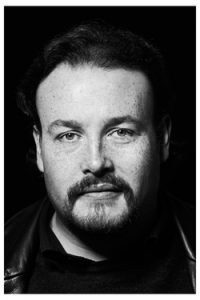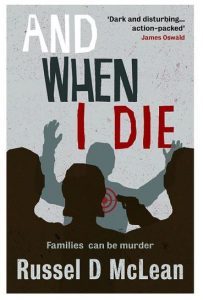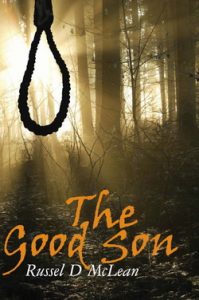The Life and Crimes of Russel D McLean: An Interview
 The DCA doesn’t seem like the right place to meet Russel D. McLean. It doesn’t seem fitting for the author of the five McNee Private Investigator novels, all set in the grimmer parts of Dundee, to be meeting up with me in this most contemporary and modern of venues. As he arrives a little flustered, clad in black and dark grey, but not as darkly serious as his publicity photographs would have us believe, he does suggest that one of his favourite public houses in Dundee is the Phoenix just down the Perth Road from where we are now. The atmosphere in there may be more fitting to the themes McLean explores in his books. Characters from his novels are more likely to be found in that pub, plotting their next infraction, rather than here in the DCA. The acoustics would be awful for my recording device however and also its Saturday afternoon and bound to be even noisier than the DCA is now. So we find a coffee and a quiet corner and settle into the story of Russel D. McLean so far. I will refer to him from now on as McLean. It’s a “crime” thing. There may be talk of violence, tales of dark deeds and a cursed mask. You have been warned.
The DCA doesn’t seem like the right place to meet Russel D. McLean. It doesn’t seem fitting for the author of the five McNee Private Investigator novels, all set in the grimmer parts of Dundee, to be meeting up with me in this most contemporary and modern of venues. As he arrives a little flustered, clad in black and dark grey, but not as darkly serious as his publicity photographs would have us believe, he does suggest that one of his favourite public houses in Dundee is the Phoenix just down the Perth Road from where we are now. The atmosphere in there may be more fitting to the themes McLean explores in his books. Characters from his novels are more likely to be found in that pub, plotting their next infraction, rather than here in the DCA. The acoustics would be awful for my recording device however and also its Saturday afternoon and bound to be even noisier than the DCA is now. So we find a coffee and a quiet corner and settle into the story of Russel D. McLean so far. I will refer to him from now on as McLean. It’s a “crime” thing. There may be talk of violence, tales of dark deeds and a cursed mask. You have been warned.
As with many stories we start near the end with the book he is promoting at the Dundee Literary Festival 2016, And When I Die, which he describes as a massive departure for him as an author in “loads of ways,” not just in terms of setting, Glasgow in lieu of Dundee, but also because it is not based on the Private Investigator format. He felt the more he wrote about McNee the more he was writing from the point of view of a damaged man looking for salvation. This he saw as “great and interesting but writing should also be about exploring other things”. As a result, and for the first time, McLean has incorporated a female perspective:
I have been annoyed with crime fiction of late for creating women as victims and girlfriends and even the heroes have become cliches within themselves, like Lisbeth Salander who is this ass kicking pixie, and it kind of reduces things a lot. So I wanted to write about women who were more normal, younger and just reflected what I knew in a way that was not easily boxed in. Kat is seen as the other character’s idealistic dream and the one they protect and yet she is not, and within herself, she is different and a little more complex than that.
Not only is the female perspective examined but also a more ensemble cast emerges from another new theme McLean wanted to explore:
I have always been fascinated by screwed up families and it comes from being an only child. Extended families always seem to hate each other. Kat has tried to push against that but the problem is that you cannot help but be part of your family and what comes through is an anger that does not translate to family loyalty because the reality is that there is none. It’s very much a case of the ones that love you always hurting you the most.
McLean also discusses the idea of families not only working together but also under the kind of pressure that builds in a criminal enterprise. The family unit thinks they are so close but they are not really and that leads to resentment and hatred which McLean describes as a “hypocrisy”.
The choice of these two themes sets up interactions between characters that feel more visceral and personally damaging which for McLean was quite deliberate: “The best thing you can do in a crime novel is explore the worst things people do to each other.” The best family relationship within the book is between Kat and her cousin Ray, which is strange given the violent actions of the latter. “She has a weird respect for him. He is absolutely honest and pure in who he is. So if there is a good family dynamic it’s between them.” This can leave the reader feeling conflicted as Ray is, as Mclean puts it, “The Terminator style Macguffin” of the piece. As the book goes on, this seemingly unstoppable killer who is motivated by revenge, becomes more of an empathetic character when compared with his father and his sibling who are described as “nasty” and a “horror” respectively, whilst “Ray is more moral in a sense because he will kill anyone but he must have reason to do so.”
Above all McLean wanted to write about Ray following the style of Richard Stark and the Parker series in which the main character is relentless and treats crime as a business. “If you get in his way he will kill you but if you don’t he will leave you alone. That seems to be where Ray started from. He will just do what he needs to and exactly only that. So if Kat got in his way he would kill her, but that does not stop him caring for her.”
Another element of what makes Ray so unyielding is that he has Hereditary sensory and autonomic neuropathy (HSAN), a congenital condition which inhibits sensation:
When I started writing this book in 2008, after I had just finished
The Lost Sister, essentially I wanted to do something very different and write about something that is relentless, that is coming after you, that just won’t stop. I tried it as science fiction and as a horror thing where he was a “Frankenstein” creation of a gang but none of it was working. I think I came back to it numerous times and then said “what if there was a way that a person could not feel pain” whereupon I discovered HSAN. The 4th level of that disease is approximately right, but the disease came with problems like pain being a warning sign without which people cannot function, for example, you wouldn’t know when you had a bit of grit in your eye so you would get infections and that would cause problems. Some people cannot sweat so that impinges on the body’s ability to regulate temperature which can be fatal and so forth. So what he has is a weird semi mix of parts of the disease that is real enough for the book to work.
Yet Mclean is unworried about slavishly following facts for his work in fiction:
Realism in books is only what is real in order for the plot to work. Everybody fudges stuff. Even the police procedural will miss out the paperwork in order to get to the important plot point and skip things for dramatic effect. That is fine because what I’ve got is something that feels real in the story I have created and in the context of what people know and that is enough.
The reader needs to be trusted to fill in the minor gaps in order to get the story to work:
As long as you do not break the laws of nature people should believe you as if you do you are possibly writing science fiction but even within that you have to create rules that are believable and make internal sense within your world building. So I stuck to the rules of Ray’s disease in a realistic way as I did not want to disrespect the people who have it.
 In sticking to these rules McLean had some unexpected affirmation from a learned source. An author that he happens to edit had done research into the illness and, having read And When I Die, wrote to Mclean telling him he had got it right in a “fictional sense, not exactly factually” but in the confines of reading the novel everything made sense.
In sticking to these rules McLean had some unexpected affirmation from a learned source. An author that he happens to edit had done research into the illness and, having read And When I Die, wrote to Mclean telling him he had got it right in a “fictional sense, not exactly factually” but in the confines of reading the novel everything made sense.
While Ray is in many ways the main character, the novel is not written from his point of view. Two other characters tell the story, the first being Kat. The second is undercover cop John who, being so addled psychologically, provides a contrast to the fixed moral point that is Ray:
In his head he is doing the right thing. I had the undercover cop idea and there were all these stories of undercover cops trying to reconcile their cover with their real life. I love the idea of fractured personalities and doing the wrong thing for the right reason or the right thing for the wrong reason which is even more fun sometimes. What if you had to split your loyalties and you do not know who you are anymore. He focuses on Kat which to him matters but she wants nothing to do with him but he has created his own universe in order to cope with the goings on around him.
And When I Die certainly uses the themes and personal traits to throw up dilemmas for its characters, and the way they interact in the ever more unusual and violent circumstances they find themselves in. “It was a series of ideas that when played together ended up very different to my original expectations. I would call it the kind of crime I like.”
Mclean also works as a freelance editor and I was very interested in how this had affected his own approach to writing. He certainly believes it has helped make him a better author:
Things like a spreadsheet co-ordinating all the characters and, I realise now, the value of redrafting like shaping a sculpture from a block of clay. Your sculpture is in there somewhere so with words it is the same once you get the first draft down the fun comes with the chipping away of words and that is when the big picture starts to change for me, and relationships within the story alter and more change comes with revision.
Also trying out other techniques with editing has made Mclean more sympathetic to the way others work on their manuscripts. He also cites his experience as a bookseller as being valuable in that it keepsyou “true to reality and realistic in what you want to achieve.” For him that is “I wouldn’t make a good Michael Connelly, I could try, but it wouldn’t be honest of me.” The experience also taught McLean how to position a book and how to go out and be confident in doing events. Working as an editor showed him how to guide authors towards their audience and, perhaps the most important lesson “readers are not stupid. If a big pushed book has not satisfied them they will let you know and they will not fall for it again.” So it is clear that experiences at all ends of the industry have been invaluable in  shaping McLean as the author he is today.
shaping McLean as the author he is today.
When it comes to the actual mechanics of getting a story down McLean has become more interested in the craft of late, having worked with more and more authors through editing. The approach varies with each new project. “The Good Son was seat of the pants stuff but The Lost Sister and also And When I Die were far more organised. The next one, which is finished, flew out really organically from a three page synopsis so that was different and the book feels different but I am pleased with how it developed.” The central element that does not vary is “I try and hit five points in everything I do. Five acts that is constant. Prologue, One, Two, Three, Epilogue. Five beats I want to cover every time. So I have one sentence description of each and build from there.” Overarching everything Mclean does within his writing is the mantra “my process is based in what feels right for this novel.”
When I seize upon him mentioning that the next novel is finished McLean actually states that he is two books ahead in what has become his “bloody women trilogy” which he himself did not envisage initially. This seemed tocoincide with him moving in with his partner who is also an author. Life imitating art imitating life? “No, I am saying nothing, she is not that scary!” Mclean maintains he does not want to do a long running series of books “I did McNee for five and I am in the middle of what has turned into a trilogy and from there we will see.”
What does the future hold for McLean? He is suddenly very animated in promoting a new idea “I want to return fictionally to Dundee with a James Ellroy-esque trilogy about the city from the 70’s to the 90’s.” The project seems to be an attractive proposition to Mclean, representing also a challenge for he is not native to Dundee and was born in the 1980’s. This is a period he, admittedly, does not know well: “You have to get it right because you need to be respectful of the people who know it well. There is some rich material to work with.” The potential for an interesting challenge seems to be the driving force, and also not a little competitiveness: “I am a very bad researcher, My partner is also an author and she loves research, adores it, I tend to shy away.”
McLean has been very rewarding to interview. Now, realising he is pushed for time, I cannot resist asking him about a flat he mentions on his website biography that he once shared with a “cursed mask”. His reaction is again nothing short of gleeful that finally someone asked him and he is eager to tell the story:
It was in a flat I rented in Dundee. The mask was a leather impression of a woman”s face hanging in a cupboard. There was a note saying that the mask had been there for the past three tenants and we recommend you do not remove it from where it hangs. So having read enough Stephen King, and not wanting to open a portal to hell, I did not do so.
With the cursed mask Mclean bids farewell. With an established body of work and two further books well advanced, and clearly an enthusiasm for his craft, Russel D. McLean will be a welcome presence within the literary crime community for some time to come.
Matt Richardson
Ed – This interview took place 22nd October 2017 at the Dundee Literary Festival.

Leave a Reply